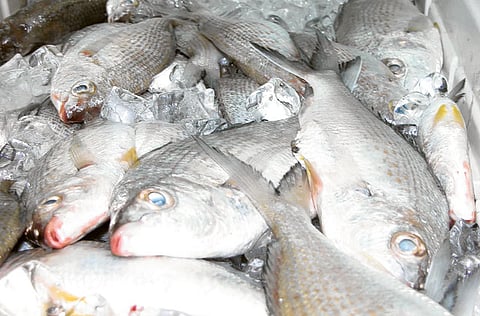Overfishing: Two-month ban on catching or selling of badah
Fishermen also prohibited from using certain types of fishing nets in UAE

Abu Dhabi The Ministry of Environment and Water has banned the catching and selling of the Longtail Silver Biddy, known locally as badah, for two months beginning April 1.
The ministry has also banned the use of certain types of fishing nets as a measure to protect popular species from overfishing.
To allow species to reproduce
The fishing and selling ban was meant to allow the fish species to reproduce during the period.
Violators of Law 23 which was issued in 1999 will be subject to severe penalties.
The use of hazra and sakar nets is banned completely while the use of dafara nets is allowed only in regions that are three nautical miles from islands and two nautical miles from the mainland, with a condition that net openings are at least 10cm.
The sakar is a type of fishing net that is 500 metres to a kilometre long and is made of plastic rope. The net is usually managed by six fishermen.
The dafara is a smaller version of the sakkar while the hazra is is a metal fixed net placed on the seabed, normally 200 metres from the coast.
The ministry will again meet next week with the representatives of fishermen's associations to discuss the directives.
Protecting resources
The meeting is a part of the ministry's goals to discuss ways to protect the country's fishery resources, and specify methods for their preservation and correct utilisation. It also aims to enhance the role and participation of all strategic partners and bodies in the decision-making process to achieve the ministry's vision in ensuring a sustainable environment.
The meeting will be presided over by the ministry's undersecretary and will discuss results of the previous meeting's agenda, specify fishing grounds where nets can be used, as well as the effects of illegal fishing activities on the environment.
The ministry holds regular meeting with relevant bodies to discuss this vital sector, and to learn of difficulties faced by fishermen, listen to proposals and to benefit from experiences in ensuring and enhancing food security, and preserving biodiversity in the UAE's waters.
Fishermen use small-sized fishing nets because they are very effective in catching all sizes of fish.
Permission
The hazra net is authorised for use only by 82 fishermen in the country and was permitted to be used from April 1 to the end of August.
Additionally, the fishing season for certain fish was adjusted to begin from June instead of April.
The high demand for fish in the UAE, combined with loss of habitat due to pollution and coastal development, along with the catching of immature fish have contributed to 60 per cent of fish decline.
Studies show that overfishing in the region, and catching fish before they reach maturity are causing certain fish varieties to approach extinction.
The hamour population, as an example, has declined by about 90 per cent due to overfishing at seven times its natural sustainable level, research shows.
"Most fish we find in the market today are small juveniles. These fish have not had a chance to mature and produce eggs. For example, 95 per cent of kanaad or kingfish, and 71 per cent of zuraidi caught are immature," Darren Hiltz, project manager of sustainable fisheries, told Gulf News.
Education campaigns
Several campaigns to educate people on the dangers of overfishing and impact of environmental hazards to the health of fish and sea life in the region are ongoing.
The Emirates Wildlife Society (EWS) and World Wide Fund for Nature (WWF) launched a ‘Choose Wisely' campaign to raise awareness about replacing overfished local species with more environment-friendly options.
Abu Dhabi Badah is a fish variety that is quite popular in the UAE.
"Badah is mainly bought by Emiratis and Egyptians. It's a nice fish of a reasonable price that varies from Dh15 to Dh25," Nader, who works in Al Sham Pearl Fish Store, told Gulf News.
Emiratis are among the most consistent consumers of this kind of fish.
"What is best about this fish is that it can be cooked in multiple ways, we love it fried, grilled or ‘mashbous' (cooked with rice), in addition it's not expensive," said Abdulla Ahmad, an Emirati. "Sea food fans must have a fish at lunch and dinner. Others eat fish at least three times a week," he added.
Ahmad explained that Emiratis' fish of choice are hamour, badah, shaari, and safi
Watchlist: Threatened species
- Hamour (orange spotted grouper)
- Shaari (spangled emperor)
- Fersh (painted sweetlips)
- Zuraidi (golden trevally)
- Kanaad( kingfish)
- Yemah (snub-nose emperor)
- Safi Arabi (white spotted spinefoot)
- Qabit (godlined seabream)
Different nets
Sakar, dafara and hazra are nets with very small holes to catch small fish. Sakar is a 500-1,000 metre net made from nylon, usually placed on the bottom of the sea. Dafara is a net that is about 100m long and is held by two fishermen each at one end. The Hazra is made of metal.



